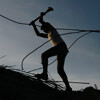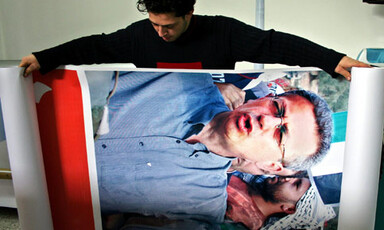
Gazans say this Eid is the worst ever
Gaza Strip 20 December 2007
A 500-meter-long street in the heart of Gaza City is empty of cars and vehicles, but full of men, women and children. Omar al-Mokhtar Street is considered the largest commercial area in Gaza where people from all over the coastal region have always come to shop, especially during the holiday season. In recent days, Gaza, like other Islamic communities around the world, prepared to celebrate Eid al-Adha, a major holiday marking the end of the annual pilgrimage to Mecca, the Hajj. Normally a time of joy, this year’s Eid is different from past years because Gaza suffers from the tight Israeli closures on all travel and commercial crossings. EI correspondent Rami Almeghari reports from Gaza. Read more about Gazans say this Eid is the worst ever








